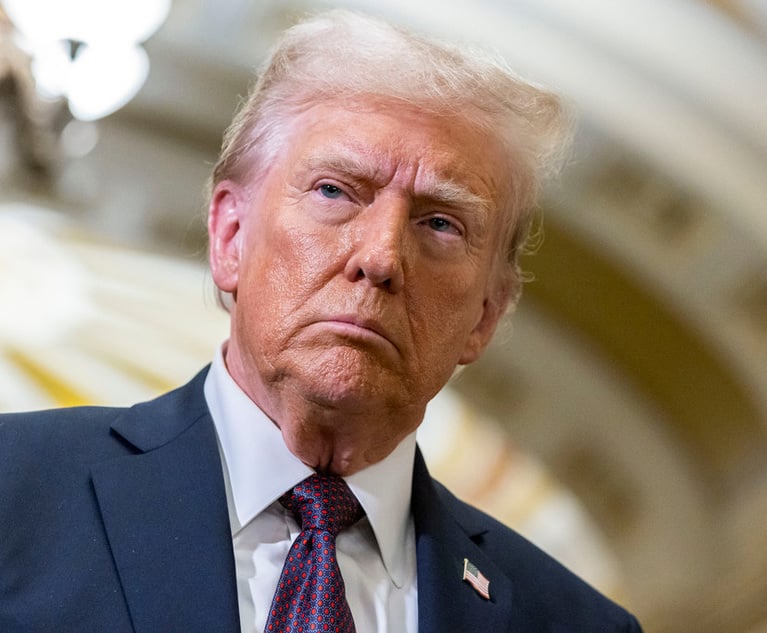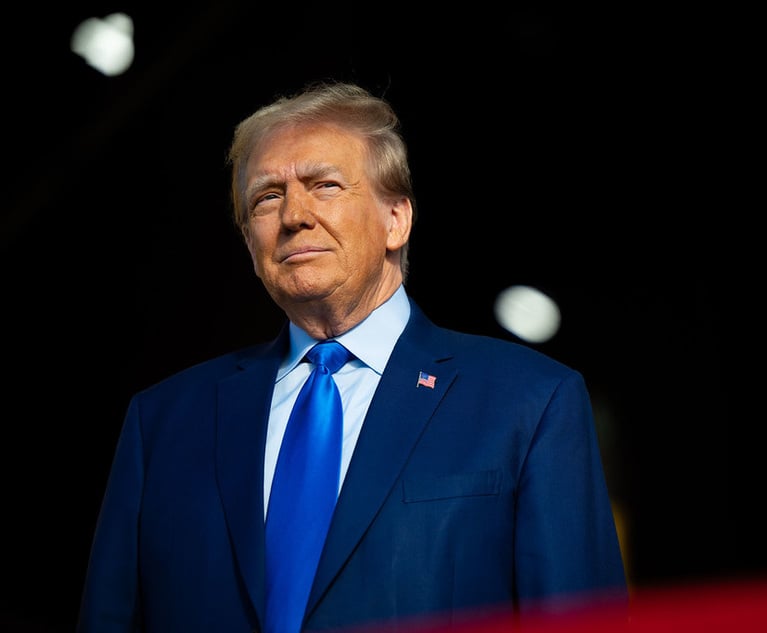 Robert Anello, left, and Richard F. Albert, right, with Morvillo Abramowitz Grand Iason & Anello. Courtesy photos
Robert Anello, left, and Richard F. Albert, right, with Morvillo Abramowitz Grand Iason & Anello. Courtesy photosFifty Years After Nixon, Progress on Amending Rule 17(c)
The authors write "Commentators long have pointed to the unfairness of applying the strict test used to assess a prosecutor’s subpoena to a sitting president in United States v. Nixon, 418 U.S. 683 (1974), to run of the mill subpoenas criminal defendants utilize to seek documentary material from third parties pursuant to Fed. R. Crim. P. 17(c). See Robert J. Anello & Richard F. Albert, Escaping ‘Nixon’s’ Legacy: the Proper Standard for Rule 17(c) Subpoenas, N.Y.L.J. (April 2, 2013). Triggered by a 2022 request from the New York City Bar Association, a subcommittee of the Advisory Committee on Criminal Rules, the official body charged with addressing proposed federal rule changes, has undertaken a comprehensive review of Rule 17."
December 11, 2024 at 10:00 AM
12 minute read
Commentators long have pointed to the unfairness of applying the strict test used to assess a prosecutor’s subpoena to a sitting president in United States v. Nixon, 418 U.S. 683 (1974), to run of the mill subpoenas criminal defendants utilize to seek documentary material from third parties pursuant to Fed. R. Crim. P. 17(c). See Robert J. Anello & Richard F. Albert, Escaping ‘Nixon’s’ Legacy: the Proper Standard for Rule 17(c) Subpoenas, N.Y.L.J. (April 2, 2013). Triggered by a 2022 request from the New York City Bar Association, a subcommittee of the Advisory Committee on criminal rules, the official body charged with addressing proposed federal rule changes, has undertaken a comprehensive review of Rule 17.
As of October 2024, the Rule 17 subcommittee made public a discussion draft of an amended rule that, although falling short of all that defense counsel would desire, makes real progress in addressing some of the most pressing concerns. Most importantly, the draft rule would allow counsel to obtain most documentary materials from third parties so long as they are “material and relevant” to the preparation of the defense, dispensing with Nixon’s requirement that a defendant make the often-impossible prior showing that unseen documents are “admissible,” and enabling defendants to obtain documents that may constitute critical impeachment material but may not themselves be admissible.
NOT FOR REPRINT
© 2025 ALM Global, LLC, All Rights Reserved. Request academic re-use from www.copyright.com. All other uses, submit a request to [email protected]. For more information visit Asset & Logo Licensing.
You Might Like
View All
Prosecutors Seek 15 Years in Prison for Ex-US Sen. Robert Menendez

'The Most Sensible Sentence': Trump Sentenced to Unconditional Discharge in Manhattan Criminal Case

New York Court of Appeals Blocks Trump Attempt to Stay Friday Sentencing

U.S. Supreme Court Denies Trump Effort to Halt Sentencing
Trending Stories
- 1'It's Not Going to Be Pretty': PayPal, Capital One Face Novel Class Actions Over 'Poaching' Commissions Owed Influencers
- 211th Circuit Rejects Trump's Emergency Request as DOJ Prepares to Release Special Counsel's Final Report
- 3Supreme Court Takes Up Challenge to ACA Task Force
- 4'Tragedy of Unspeakable Proportions:' Could Edison, DWP, Face Lawsuits Over LA Wildfires?
- 5Meta Pulls Plug on DEI Programs
Who Got The Work
Michael G. Bongiorno, Andrew Scott Dulberg and Elizabeth E. Driscoll from Wilmer Cutler Pickering Hale and Dorr have stepped in to represent Symbotic Inc., an A.I.-enabled technology platform that focuses on increasing supply chain efficiency, and other defendants in a pending shareholder derivative lawsuit. The case, filed Oct. 2 in Massachusetts District Court by the Brown Law Firm on behalf of Stephen Austen, accuses certain officers and directors of misleading investors in regard to Symbotic's potential for margin growth by failing to disclose that the company was not equipped to timely deploy its systems or manage expenses through project delays. The case, assigned to U.S. District Judge Nathaniel M. Gorton, is 1:24-cv-12522, Austen v. Cohen et al.
Who Got The Work
Edmund Polubinski and Marie Killmond of Davis Polk & Wardwell have entered appearances for data platform software development company MongoDB and other defendants in a pending shareholder derivative lawsuit. The action, filed Oct. 7 in New York Southern District Court by the Brown Law Firm, accuses the company's directors and/or officers of falsely expressing confidence in the company’s restructuring of its sales incentive plan and downplaying the severity of decreases in its upfront commitments. The case is 1:24-cv-07594, Roy v. Ittycheria et al.
Who Got The Work
Amy O. Bruchs and Kurt F. Ellison of Michael Best & Friedrich have entered appearances for Epic Systems Corp. in a pending employment discrimination lawsuit. The suit was filed Sept. 7 in Wisconsin Western District Court by Levine Eisberner LLC and Siri & Glimstad on behalf of a project manager who claims that he was wrongfully terminated after applying for a religious exemption to the defendant's COVID-19 vaccine mandate. The case, assigned to U.S. Magistrate Judge Anita Marie Boor, is 3:24-cv-00630, Secker, Nathan v. Epic Systems Corporation.
Who Got The Work
David X. Sullivan, Thomas J. Finn and Gregory A. Hall from McCarter & English have entered appearances for Sunrun Installation Services in a pending civil rights lawsuit. The complaint was filed Sept. 4 in Connecticut District Court by attorney Robert M. Berke on behalf of former employee George Edward Steins, who was arrested and charged with employing an unregistered home improvement salesperson. The complaint alleges that had Sunrun informed the Connecticut Department of Consumer Protection that the plaintiff's employment had ended in 2017 and that he no longer held Sunrun's home improvement contractor license, he would not have been hit with charges, which were dismissed in May 2024. The case, assigned to U.S. District Judge Jeffrey A. Meyer, is 3:24-cv-01423, Steins v. Sunrun, Inc. et al.
Who Got The Work
Greenberg Traurig shareholder Joshua L. Raskin has entered an appearance for boohoo.com UK Ltd. in a pending patent infringement lawsuit. The suit, filed Sept. 3 in Texas Eastern District Court by Rozier Hardt McDonough on behalf of Alto Dynamics, asserts five patents related to an online shopping platform. The case, assigned to U.S. District Judge Rodney Gilstrap, is 2:24-cv-00719, Alto Dynamics, LLC v. boohoo.com UK Limited.
Featured Firms
Law Offices of Gary Martin Hays & Associates, P.C.
(470) 294-1674
Law Offices of Mark E. Salomone
(857) 444-6468
Smith & Hassler
(713) 739-1250






